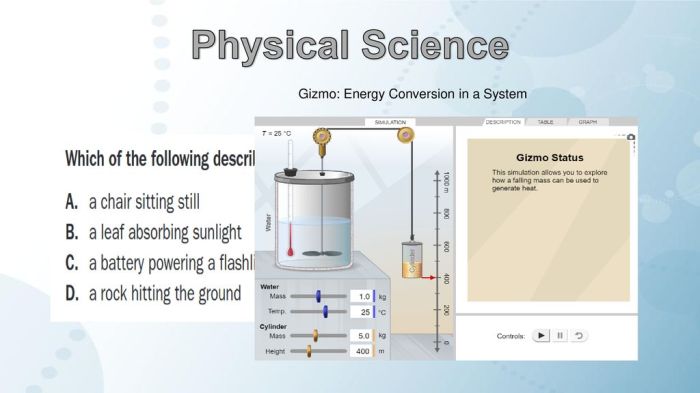Gizmo answer key energy conversion in a system – Embark on an enlightening journey into the realm of energy conversion with our comprehensive Gizmo answer key. This guide delves into the fundamental principles, diverse types, and practical applications of energy conversion within various systems, equipping you with a profound understanding of this transformative process.
Through an engaging exploration of the Gizmo simulation, you will uncover the intricacies of energy conversion, empowering you to analyze data, identify patterns, and draw meaningful conclusions. Moreover, you will gain valuable insights into strategies for enhancing energy efficiency and promoting conservation, fostering a sustainable approach to energy utilization.
Energy Conversion Concepts

Energy conversion is the process of changing energy from one form to another. This process is essential for many everyday activities, such as generating electricity, powering cars, and heating homes.
There are many different types of energy conversion, including:
- Mechanical to electrical
- Electrical to thermal
- Thermal to mechanical
- Chemical to electrical
- Electrical to chemical
Each type of energy conversion has its own unique efficiency, which is a measure of how much of the input energy is converted to the output energy.
Gizmo Simulation Overview, Gizmo answer key energy conversion in a system
The Gizmo simulation on energy conversion allows students to explore the different types of energy conversion and their efficiencies.
The simulation has two main modes:
- Explore modeallows students to experiment with different types of energy conversion and see how they affect the efficiency of the system.
- Challenge modechallenges students to design a system that converts energy from one form to another with a high efficiency.
The simulation also includes a number of resources to help students learn about energy conversion, including a tutorial, a glossary, and a help file.
Data Analysis and Interpretation
The data from the Gizmo simulation can be used to analyze the efficiency of different types of energy conversion.
To analyze the data, students can:
- Plot the data on a graph to see how the efficiency of the system changes as the input energy changes.
- Calculate the efficiency of the system using the following formula:
Efficiency = Output energy / Input energy - Compare the efficiencies of different types of energy conversion.
The data analysis can help students to understand the different factors that affect the efficiency of energy conversion.
Energy Efficiency and Conservation
Energy efficiency is the practice of using energy in a way that minimizes waste.
There are many ways to improve energy efficiency, including:
- Using energy-efficient appliances
- Turning off lights when you leave a room
- Unplugging electronics when you’re not using them
- Driving less and walking or biking more
Energy conservation is the practice of reducing the amount of energy we use.
There are many ways to conserve energy, including:
- Using public transportation or carpooling
- Weatherizing your home
- Buying renewable energy
Energy efficiency and conservation are important for reducing our impact on the environment and saving money.
Applications of Energy Conversion
Energy conversion is used in a wide variety of applications, including:
- Generating electricity
- Powering cars
- Heating homes
- Cooling homes
- Manufacturing
- Transportation
Energy conversion is essential for our modern way of life.
Questions Often Asked: Gizmo Answer Key Energy Conversion In A System
What is the primary purpose of the Gizmo simulation on energy conversion?
The Gizmo simulation aims to provide an interactive platform for students to explore the principles of energy conversion, enabling them to visualize and analyze the transformation of energy within various systems.
How can I improve energy efficiency in my home or workplace?
Implementing energy-efficient practices such as utilizing energy-saving appliances, optimizing lighting systems, and implementing proper insulation can significantly enhance energy efficiency and reduce energy consumption.